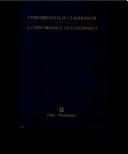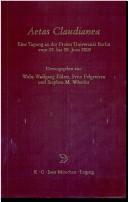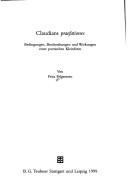| Listing 1 - 10 of 15 | << page >> |
Sort by
|

ISBN: 3487078481 9783487078489 Year: 1988 Volume: 47 Publisher: Hildesheim: Olms,
Abstract | Keywords | Export | Availability | Bookmark
 Loading...
Loading...Choose an application
- Reference Manager
- EndNote
- RefWorks (Direct export to RefWorks)
Classical Latin literature --- Claudianus, Claudius --- Latin poetry --- Concordances. --- -Latin literature --- Concordances --- -Claudian --- Claudien --- Claudià, Claudi --- Claudiano, Claudio --- Klavdian --- Клавдиан --- Klavdian, Klavdiĭ --- Клавдиан, Клавдий --- Pseudo-Claudianus --- -Concordances --- -Claudien --- Claudius Claudianus --- Latin literature --- Claudian --- Latin poetry - Concordances.
Multi
ISSN: 12846325 ISBN: 9782701802800 2701802806 Year: 2010 Volume: *6 Publisher: Paris: De Boccard,
Abstract | Keywords | Export | Availability | Bookmark
 Loading...
Loading...Choose an application
- Reference Manager
- EndNote
- RefWorks (Direct export to RefWorks)
Claudianus, Claudius --- Criticism and interpretation. --- Claudien --- Claudius Claudianus --- Claudiano, Claudio --- Criticism and interpretation --- Claudian --- Claudià, Claudi --- Klavdian --- Клавдиан --- Klavdian, Klavdiĭ --- Клавдиан, Клавдий --- Pseudo-Claudianus --- Claudianus, Claudius - Criticism and interpretation --- Claudien (0370?-0404?) --- Critique et interprétation
Book
ISBN: 9781032416786 9780367373641 0367373645 1032416785 0429353340 100082182X Year: 2023 Publisher: Abingdon Routledge
Abstract | Keywords | Export | Availability | Bookmark
 Loading...
Loading...Choose an application
- Reference Manager
- EndNote
- RefWorks (Direct export to RefWorks)
"This volume offers a modern, accurate, and accessible translation of Claudian's work, published in English for the first time since 1922, accompanied by detailed notes and comprehensive glossary. Claudian (active 395-404 CE) was the last of the great classical Latin poets. His best-known work, The Rape of Proserpina, continues to inspire numerous retellings and adaptations. Claudian also wrote poems in praise of rulers, including the emperor Honorius and the regent Flavius Stilicho, which are essential sources for reconstructing politics and society in the late Roman empire. These poems and others are translated here, alongside an introduction offering an overview of Claudian's career, the wider historical and political context of the period, and the poetic traditions in which Claudian wrote: mythological epic, panegyric, invective, and epithalamium. The translations, with explanatory notes, include: The Rape of Proserpina, Panegyric on Olybrius and Probinus' Consulship, Panegyrics on Honorius' Third, Fourth, and Sixth Consulships, Invective Against Rufinus, Fescennines and Epithalamium for Honorius and Maria, The War With Gildo, Panegyric on Manlius Theodorus' Consulship, Invective Against Eutropius, Panegyric on Stilicho's Consulship, The Gothic War, and shorter poems. The Complete Works of Claudian is a vital resource for students and scholars working on late antique literature, particularly Claudian's work, as well as those studying the history and culture of the western Roman Empire in this period. This accessible volume is also suitable for the general reader interested in the works of Claudian and this period more broadly"--
Claudianus, Claudius --- Claudian --- Claudien --- Claudià, Claudi --- Claudiano, Claudio --- Claudius Claudianus --- Klavdian --- Клавдиан --- Klavdian, Klavdiĭ --- Клавдиан, Клавдий --- Pseudo-Claudianus
Book
ISBN: 9782251450353 2251450351 Year: 2019 Publisher: Paris: Les Belles Lettres,
Abstract | Keywords | Export | Availability | Bookmark
 Loading...
Loading...Choose an application
- Reference Manager
- EndNote
- RefWorks (Direct export to RefWorks)
Claudien, originaire d'Alexandrie, est poète officiel à la cour de Milan entre 395 et 404 ap. J.-C. Alors que la scission de l'Empire entre Orient et Occident s'accentue, que la menace des Wisigoths pèse de plus en plus pour l'Italie, il commente au fil des ans la politique, dans une perspective romaine, sous forme de panégyriques, de blâmes, d'épopées historiques - mais il est également l'auteur d'épopées mythologiques, d'épithalames et de plusieurs pièces de circonstance. Dans toutes ces œuvres, Claudien puise largement dans la tradition de l'épopée classique. La question générique est ainsi au cœur des études claudianéennes. Dans cet ouvrage, l'auteur propose une approche systématique, prenant en compte la totalité du corpus et analysant des éléments stylistiques, thématiques et formels pour s'attacher à définir au mieux la poétique de celui que l'on considère traditionnellement comme le dernier poète païen d'inspiration classique.
Epic poetry, Latin --- History and criticism. --- Claudianus, Claudius --- Literary style. --- Poésie latine. --- Themes, motives. --- Épopées latines. --- Épopées --- Histoire et critique. --- Claudien, --- Claudien. --- Claudianus, Claudius. --- Claudien --- Critique et interprétation. --- Criticism and interpretation. --- Style. --- Thèmes, motifs. --- Épopées. --- Poésie latine. --- Critique et interprétation.

ISBN: 3598730209 Year: 2004 Publisher: München : Saur,
Abstract | Keywords | Export | Availability | Bookmark
 Loading...
Loading...Choose an application
- Reference Manager
- EndNote
- RefWorks (Direct export to RefWorks)
Claudianus, Claudius --- Claudien --- Claudius Claudianus --- Claudiano, Claudio --- Criticism and interpretation --- Claudian --- Claudià, Claudi --- Klavdian --- Клавдиан --- Klavdian, Klavdiĭ --- Клавдиан, Клавдий --- Pseudo-Claudianus --- Critiique et interprétation --- Critiique et interprétation.
Book
ISBN: 9782600007597 2600007598 9783774938687 3774938687 Year: 2013 Volume: 59 Publisher: Genève: Fondation Hardt,
Abstract | Keywords | Export | Availability | Bookmark
 Loading...
Loading...Choose an application
- Reference Manager
- EndNote
- RefWorks (Direct export to RefWorks)
Civilization, Greco-Roman --- Civilisation gréco-romaine --- Congresses. --- Congrès --- Rome --- Greece --- Grèce --- Civilization --- Greek influences --- Roman influences --- Congresses --- Civilisation --- Influence grecque --- Influence romaine --- Rome ancienne --- --Grèce ancienne --- --Civilisation --- --Influence --- --Congrès --- --Congresses --- Romanisation --- Plutarque (0046?-0120?) s --- Quintus de Smyrne (03..-03..) --- Claudien (0370?-0404?) --- Critique et interprétation --- Conferences - Meetings --- Actes de congrès. --- Plutarque --- Quintus de Smyrne --- Claudien --- Critique et interprétation. --- Plutarque, --- Quintus de Smyrne, --- Claudien, --- Civilisation gréco-romaine --- Congrès --- Grèce --- --Rome --- Romanisation. --- Critique et interprétation --- Quintus de Smyrne (03-03) --- Civilization, Greco-Roman - Congresses --- Grèce ancienne --- Influence --- Rome - Civilization - Greek influences - Congresses --- Greece - Civilization - Roman influences - Congresses
Book
ISBN: 9781107013438 1107013437 9781139004152 1139411470 1107229502 1139422839 9786613659934 1139419811 1139421867 1139423908 1139417762 1139004158 128068299X 9781139423908 9781280682995 9781139421867 9781139419819 9781107229501 9781139411479 6613659932 9781139422833 9781139417761 Year: 2012 Publisher: Cambridge ; New York : Cambridge University Press,
Abstract | Keywords | Export | Availability | Bookmark
 Loading...
Loading...Choose an application
- Reference Manager
- EndNote
- RefWorks (Direct export to RefWorks)
The historical importance of Claudian as writer of panegyric and propaganda for the court of Honorius is well established but his poetry has been comparatively neglected: only recently has his work been the subject of modern literary criticism. Taking as its starting point Claudian's claim to be the heir to Virgil, this book examines his poetry as part of the Roman epic tradition. Discussing first what we understand by epic and its relevance for late antiquity, Catherine Ware argues that, like Virgil and later Roman epic poets, Claudian analyses his contemporary world in terms of classical epic. Engaging intertextually with his literary predecessors, Claudian updates concepts such as furor and concordia, redefining Romanitas to exclude the increasingly hostile east, depicting enemies of the west as new Giants and showing how the government of Honorius and his chief minister, Stilicho, have brought about a true golden age for the west.
Epic poetry, Classical --- History and criticism. --- Claudianus, Claudius --- Criticism and interpretation. --- Rome --- In literature. --- History and criticism --- Claudien --- Claudius Claudianus --- Claudiano, Claudio --- Claudian --- Claudià, Claudi --- Klavdian --- Клавдиан --- Klavdian, Klavdiĭ --- Клавдиан, Клавдий --- Pseudo-Claudianus --- Arts and Humanities --- History
Book
ISBN: 9781107058347 1107058341 9781107415645 9781107678064 1108564992 1107415640 1108614337 Year: 2017 Publisher: Cambridge: Cambridge university press,
Abstract | Keywords | Export | Availability | Bookmark
 Loading...
Loading...Choose an application
- Reference Manager
- EndNote
- RefWorks (Direct export to RefWorks)
This comprehensive reassessment of the carmina maiora of the fourth-century poet Claudian contributes to the growing trend to recognize that Late Antique poets should be approached as just that: poets. Its methodology is developed from that of Michael Roberts' seminal The Jeweled Style. It analyzes Claudian's poetics and use of story telling to argue that the creation of a story world in which Stilicho, his patron, becomes an epic hero, and the barbarians are giants threatening both the borders of Rome and the order of the very universe is designed to convince his audience of a world-view in which it is only the Roman general who stands between them and cosmic chaos. The book also argues that Claudian uses the same techniques to promote the message that Honorius, young hero though he may seem, is not yet fit to rule, and that Stilicho's rightful position remains as his regent.
Claudianus, Claudius --- Criticism and interpretation. --- Claudianus, Claudius. --- Criticism and interpretation --- Claudian --- Claudien --- Claudià, Claudi --- Claudiano, Claudio --- Claudius Claudianus --- Klavdian --- Клавдиан --- Klavdian, Klavdiĭ --- Клавдиан, Клавдий --- Pseudo-Claudianus --- E-books --- Claudianus, Claudius - Criticism and interpretation
Book
ISBN: 9782870312452 2870312458 Year: 2007 Volume: 304 Publisher: Bruxelles: Éditions Latomus,
Abstract | Keywords | Export | Availability | Bookmark
 Loading...
Loading...Choose an application
- Reference Manager
- EndNote
- RefWorks (Direct export to RefWorks)
Injures dans la littérature --- Invective in literature --- Scheldwoorden in de literatuur --- Verse satire, Latin --- Invectives dans la littérature --- Poésie satirique latine --- History and criticism --- Histoire et critique --- Claudianus, Claudius --- Violence in literature --- Invective in literature. --- Violence in literature. --- Criticism and interpretation. --- Invectives dans la littérature --- Poésie satirique latine --- Claudien --- Claudius Claudianus --- Claudiano, Claudio --- Verse satire [Latin ] --- Claudian --- Claudià, Claudi --- Klavdian --- Клавдиан --- Klavdian, Klavdiĭ --- Клавдиан, Клавдий --- Pseudo-Claudianus --- Claudien (0370?-0404?) --- Critique et interprétation

ISBN: 3519076799 9783598776793 Year: 1999 Volume: 130 Publisher: Stuttgart ; Leipzig B.G. Teubner
Abstract | Keywords | Export | Availability | Bookmark
 Loading...
Loading...Choose an application
- Reference Manager
- EndNote
- RefWorks (Direct export to RefWorks)
Laudatory poetry, Latin --- -Literary form --- -Prefaces --- -Prologues and epilogues --- Form, Literary --- Forms, Literary --- Forms of literature --- Genre (Literature) --- Genre, Literary --- Genres, Literary --- Genres of literature --- Literary forms --- Literary genetics --- Literary genres --- Literary types (Genres) --- Literature --- Latin laudatory poetry --- Latin poetry --- History and criticism --- History --- -History and criticism --- Claudianus, Claudius --- -Claudian --- Claudien --- Claudià, Claudi --- Claudiano, Claudio --- Klavdian --- Клавдиан --- Klavdian, Klavdiĭ --- Клавдиан, Клавдий --- Pseudo-Claudianus --- Criticism and interpretation --- Rome --- In literature. --- Literary form --- Prefaces --- History and criticism. --- Criticism and interpretation. --- -Criticism and interpretation --- -Form, Literary --- -Claudien --- Claudius Claudianus --- Paratexte --- Préfaces --- Poésie latine --- Literary form. --- Dans la littérature --- Histoire et critique --- Claudien (0370?-0404?) --- Critique et interprétation --- Paratexte. --- Dans la littérature. --- Histoire et critique. --- Claudian --- Critique et interprétation. --- Préfaces --- Poésie latine --- Dans la littérature. --- Critique et interprétation.
| Listing 1 - 10 of 15 | << page >> |
Sort by
|

 Search
Search Feedback
Feedback About UniCat
About UniCat  Help
Help News
News